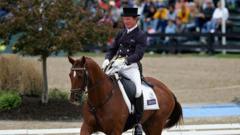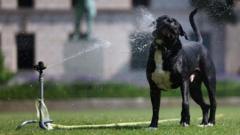Is the FEI Investigating Ryan for Whipping His Horse?

Understanding the Controversy: Horse Welfare in Equestrian Sports
The world of equestrian sports has always been a blend of artistry, athleticism, and deep connections between horse and rider. However, recent events surrounding Australian Olympian Heath Ryan have sparked a significant debate about the ethics of horse training practices. Following the emergence of a video appearing to show Ryan striking a horse multiple times, both Equestrian Australia and the Fédération Equestre Internationale (FEI) have taken action, leading to a provisional suspension for Ryan as investigations proceed. This incident has not only raised questions about Ryan's methods but also about the broader implications for equestrian sports and horse welfare.
The Incident: What Happened?
Heath Ryan, a seasoned competitor who represented Australia in dressage at the 2008 Beijing Olympics, found himself in hot water when a video surfaced showing him allegedly whipping a horse named Nico about 40 times. Ryan stated that the video was recorded approximately two years prior to its release, and he justified his actions by claiming he was acting in the horse’s best interest during a critical moment. According to Ryan, Nico had been involved in an accident that left a female rider hospitalized, and he believed that the horse was a "problem child" that required strong guidance.
The Response from Authorities
In light of the video, Equestrian Australia suspended Ryan and reported the incident to the FEI, which subsequently launched its own investigation. The FEI's Secretary General, Sabrina Ibanez, condemned the video, stating that the scenes were "profoundly disturbing" and contradicted the core values of horse welfare that the organization upholds. The FEI's commitment to examining such allegations underscores the seriousness with which they approach horse welfare issues.
Understanding Horse Welfare in Equestrian Sports
Horse welfare is a central concern in equestrian sports. The relationship between horse and rider should be based on trust and mutual respect. However, incidents like the one involving Ryan challenge this ideal, prompting a closer look at the standards of training and treatment that horses receive. Equestrian sports are governed by strict regulations designed to protect the welfare of horses, but enforcing these standards can be complex.
The Importance of Training Techniques
Training techniques vary widely across disciplines, from dressage to jumping to eventing. However, the core principle should always be the welfare of the horse. Effective training should involve:
- Positive Reinforcement: Encouraging desired behaviors through rewards rather than punishment.
- Understanding Equine Behavior: Recognizing the natural instincts and behaviors of horses can lead to more effective training approaches.
- Consistent and Gentle Handling: Building trust through consistent and gentle handling methods fosters a better relationship.
Disciplinary Actions and Their Implications
Following the incident, Ryan’s provisional suspension serves as a reminder of the serious repercussions that can result from perceived abuses in horse training. The FEI's investigation aims to uncover all relevant facts and determine appropriate disciplinary actions under its rules and regulations. Such actions are crucial not only for accountability but also for maintaining public trust in equestrian sports.
Previous Cases and Comparisons
This is not the first incident to raise concerns about horse welfare in high-profile equestrian competitions. Britain's Charlotte Dujardin, a three-time Olympic champion, was also suspended after a video surfaced showing her using a long whip on a horse. Her case, among others, illustrates the ongoing need for vigilance in ensuring that training techniques align with ethical treatment standards.
The Broader Conversation: Ethics in Equestrian Sports
The conversation surrounding horse welfare is not limited to individual incidents. It encompasses a broader ethical discourse about how horses are treated in the competitive sphere. Key areas of concern include:
- Training Methods: The methods used by trainers can significantly impact horse welfare. Innovative training techniques that emphasize partnership can lead to better outcomes.
- Public Perception: Incidents of perceived abuse can tarnish the reputation of the sport and lead to public backlash, which in turn affects funding and support for equestrian events.
- Regulatory Oversight: Stronger oversight by governing bodies like the FEI is essential to ensure compliance with welfare standards and maintain the integrity of the sport.
The Future of Equestrian Sports
As investigations into Heath Ryan’s actions continue, the future of equestrian sports hangs in a delicate balance. The outcome of these proceedings may have lasting effects on how training methods are viewed and regulated. It is crucial for governing bodies to take a firm stand against practices that compromise horse welfare while also encouraging education and awareness about humane training methods.
The Role of Education and Advocacy
Education plays a pivotal role in shaping the future of equestrian sports. By advocating for humane training practices and promoting awareness about horse behavior, organizations can foster a culture of respect and care within the equestrian community. Workshops, seminars, and educational resources can help trainers and riders learn about effective techniques that prioritize horse welfare.
Conclusion: A Call to Action for Equestrian Enthusiasts
The recent events surrounding Heath Ryan serve as a crucial reminder of the responsibilities that come with equestrian sports. As a community, it is essential to advocate for practices that prioritize horse welfare, ensuring that the bond between horse and rider is built on trust, compassion, and respect. The journey towards improving equestrian practices is ongoing, and it requires a collective effort from all stakeholders involved—from trainers and riders to governing bodies and fans. As we move forward, let us strive to enhance the welfare of our equine partners, ensuring that they are treated with the dignity they deserve.
FAQs
What are the main concerns regarding horse welfare in equestrian sports?
Concerns include the use of abusive training techniques, inadequate treatment, and the overall ethics of horse management. Ensuring humane practices is vital for the welfare of the horses involved.
How does the FEI ensure compliance with horse welfare standards?
The FEI implements regulations and oversees investigations into allegations of abuse. It is committed to maintaining the highest standards of horse welfare in the sport.
What can be done to promote better training methods in equestrian sports?
Education and awareness campaigns can help trainers adopt humane methods. Workshops and resources that focus on positive reinforcement and understanding equine behavior can significantly impact training practices.
As the equestrian community grapples with these pressing issues, what steps do you think should be taken to ensure that horse welfare remains a priority? #HorseWelfare #EquestrianEthics #EquestrianSports
Published: 2025-06-19 20:33:16 | Category: sport



